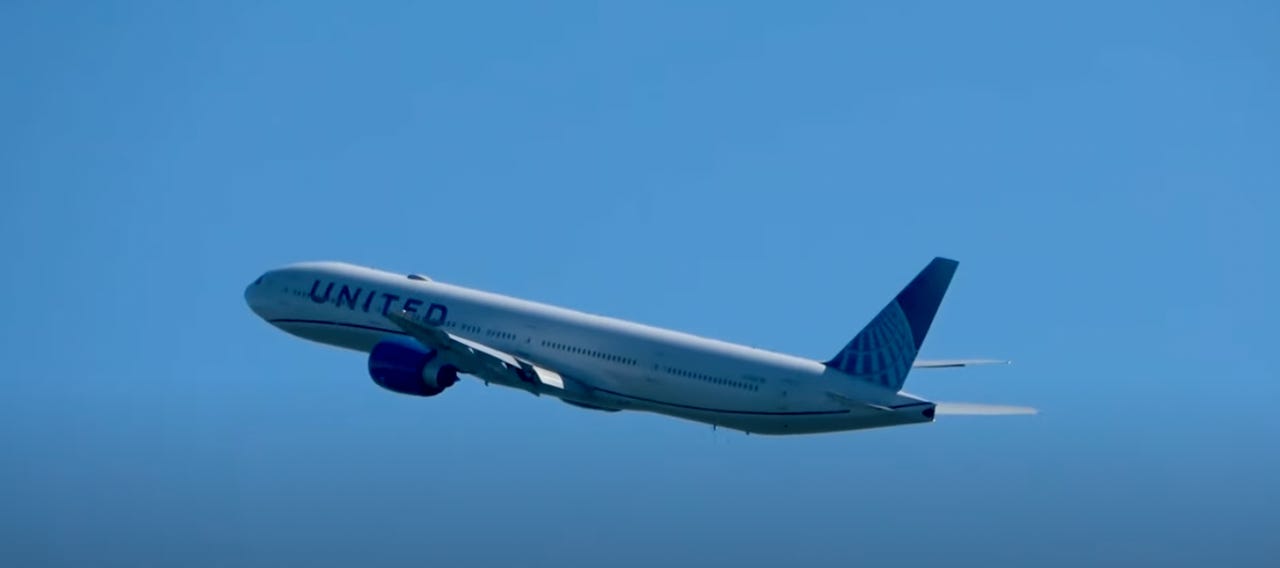
































Really?
Screenshot by ZDNetIf you've flown on an airline lately, you'll likely have strong feelings.
Many of those feelings might verge toward the negative.
Yes, it's wonderful to be flying away on a business trip again, but just look at the delays and cancellations. And just look at the reasons.
No, it's not just weather. Southwest, for example, recently warned customers its technology wasn't all that. Then it canceled 2,000 flights.
The return to the air is, then, likely to be a bumpy experience.
This may be a reason for airlines to be tempered in the way they deal with customers.
But through a side door comes United Airlines.
United has been a peculiar anomaly of late.
It hasn't incited an excess of ill will. It hasn't (seemed to have) canceled too many flights or endured too many unpleasant passenger interactions -- caused by itself, you understand -- for which it used to be so well known.
I worry, though, that this might all have gone to United's head.
You see, the airline's CEO Scott Kirby just outlined his vision for the future. All CEOs have a vision, of course. Too many airline CEOs have a vision of enormous stock bonuses.
Kirby, on the other hand, has undergone an apparent reinvention. From turgid cost-cutting, customer-ignoring executive to progressive, enlightened, customer-embracing executive.
This has clearly affected his vision.
As reported byLive and Let's Fly, Kirby's latest video address to employees offered four pillars upon which they should mount their future.
The goal?
Oh, are you ready for this?
Are you sure?
Alright. United's goal is "to really establish ourselves as the biggest and the best airline in the history of aviation."
Not just the biggest and best today. But the biggest and best ever.
Ah. Oh.
Perhaps you have your own favorite airline, one that makes you feel very slightly better when your flight's delayed or the pilots haven't turned up.
Perhaps you have an airline that serves better food or doesn't cram in quite as many seats as its competitors.
I certainly used to fly Continental because it had better food. And then United took it over and things went a tad awry.
Still, let's examine United's pillars. The airline is promising an updated version of itself, which includes 500 new planes.
"If we're successful bringing these 500 airplanes on board," said Kirby, "we are so far ahead of any of our competitors that there's really no way that anyone can catch up to us."
It's all getting a little boasty, isn't it?
Pillar Number Two is operational excellence. United did introduce a technology called Connection Saver. This promised to hold planes for a little longer so that connecting passengers could make their flight. Ach, but now it's decided that leaving on time may be more important.
And there you were thinking arriving on time was more important.
Pillar Number Three is, quite naturally, the customer service thing. Said Kirby: "I think that in the end is going to be probably the most enduring change that we all are able to look back on at the end of COVID and say, what changed the most about United Airlines."
Fascinating. But isn't United in the same, um, boat as other airlines in not being able to hire enough staff? That's surely one of the core seeds of difficult customer relations.
I feel sure, however, that you've been most excited about Pillar Number Four. This is the one where United promises something so different, so radical that it truly can live up to being the, what was it, biggest and the best airline in the history of aviation.
Please welcome, then, the pillar of CSAMx.
New aviation technology? In a way. It stands for Cost Per Available Seat-Mile. Yes, United intends to squeeze more money, more cheaply out of every single customer.
And it sees technology as the way to get there.
In Kirby's words: "What we also have to do is use all the technology that we created that many other airlines don't have. We've created new processes, new technology, that are going to allow us to have costs that come down over time."
This may be wonderful for the airline. It may even signify marginal improvement for passengers.
Here's the real problem.
Making absurdly extravagant boasts at a time when flying remains a largely unpleasant experience seems a touch rich.
Airlines have eschewed wide-body planes in favor of more efficient narrowbodies. They've stuffed more seats onto each plane, reducing legroom and general comfort. Their technological offerings -- as basic as wifi -- haven't exactly stirred joy.
They've exacerbated the potential for passenger friction by increasing discomfort. And the larger they've grown, the less incentive they seem to have to make things better for passengers.
To claim you're creating the biggest and best airline in the history of aviation smacks of a troublingly oxymoronic windbaggery.
It's as if he never flew Virgin Atlantic in its finest days. I remember once getting a massage on a flight. United will do something similar?
Technology can do something to relieve the occasional airline frustration. Yet United's Agent on Demand feature -- akin to other airlines' AI customer service attempts -- hasn't been the biggest and best success in the history of aviation. So far.
What United is really promising is to become a better United. Perhaps even the best United in the history of aviation. There are signs this could happen.
It's unwise, though, to let customers hear you're going to be the biggest and the best ever in the history of the world.
Only political leaders do that. And we all know where that ends.
 Tags chauds:
affaires
Tags chauds:
affaires